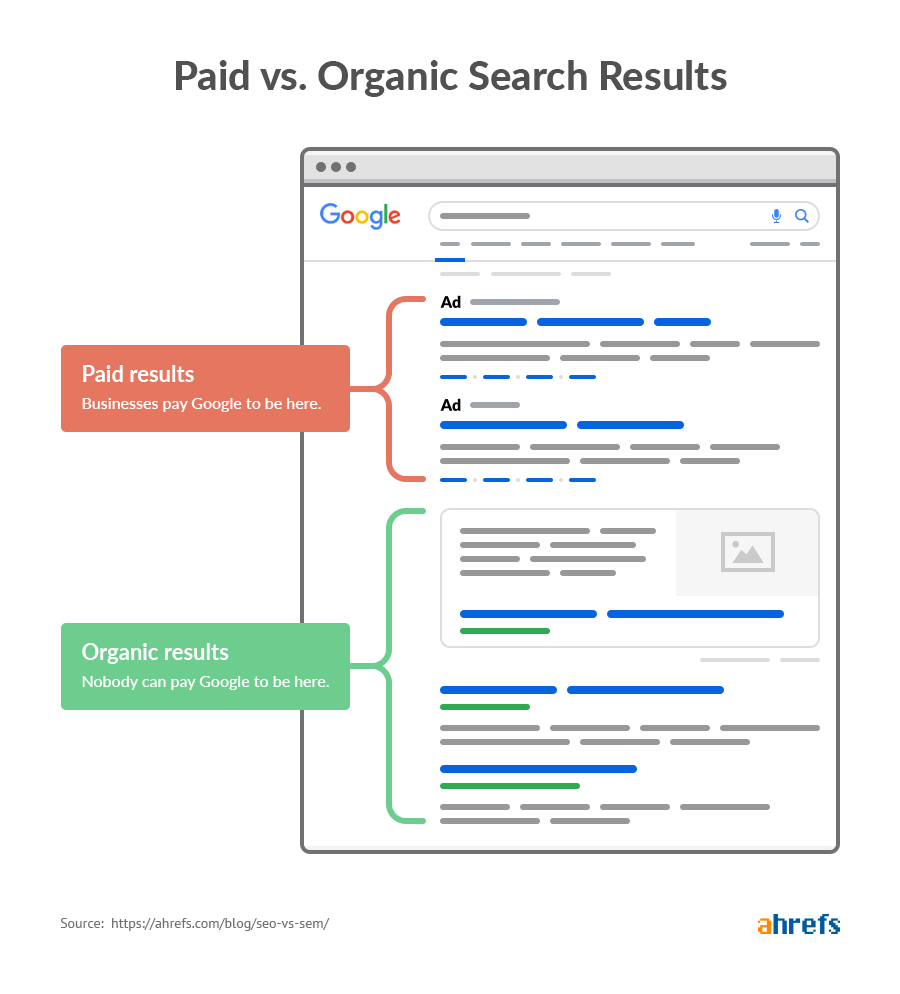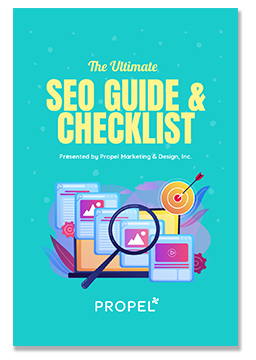SEO stands for search engine optimization, and it’s precisely that- optimizing your website for the search engines (namely Google) to like it and show it as a result of a user’s question.
It’s how you get your site’s pages found at the top of the SERPs (search engine results pages), and as you can imagine, it’s no small task.
With literally millions of businesses found on the web, how do you get yours on page one of the SERPs? You adhere to the SEO guidelines.
Today, we’ll tell you all you need to know about SEO so you can make that happen.
Why you need a good SEO strategy
When your SEO strategy is on point, you’re:
- Sitting high on the Google ladder
- Getting more traffic to your website
- Getting more conversions
- Getting more sales
- Getting more followers
- Getting more interactions with your audience
- Getting a better ROI (return on investment)
- Basically, getting more of all the good stuff
When a user heads to Google and types in their search, you need to ensure that you’ve given Google enough of what it needs to know, leading it to your website and making yours the best result for the user’s query.
This is a huge deal because it’s allowing your audience to find you organically.
Organically, you ask?
Free.
It’s a free way to get in front of your user’s face.
Meaning, you don’t have to pay for ads; your SEO campaign is so strong, Google can easily and accurately play matchmaker between you and your users.
With just one first page of Google, competition runs high. Add to that the consistent changes to Google’s algorithms, and you’ve got yourself a little challenge on your hands. But, not to fret! There are great, achievable ways to get your site noticed for all the right reasons.
Organic search and paid search
Before we go further, let’s discuss the difference between organic search and paid search.
Organic search
We went over organic search above, but here’s your recap: organic traffic is simply when a user finds you through your adherence to SEO algorithms and following SEO best practices alone.
Paid search
You may have seen the top spots on a SERP look like the page below.

Image source: ahref
Notice how the top two in the list have the word “Ad” in front of them? Those are paid-for search results. These Ads are shown at the top of the SERPs. The first organic search result is coming in third in this example.
Paid results are a great way to help your business get some recognition quickly and that can benefit your organic campaign in the future; building brand awareness, getting more traffic to your site, and contributing to your user experience, ROI, and more.
The end goal; however, should be to get organic traffic from your high ranking on the search engine results pages.
When will I see results after I start my organic SEO campaign?
We get asked this question more than a kid asks, “How much longer?” on your road trip from Florida to Colorado. And, while there’s no conclusive answer to the SEO question, you gotta understand that SEO is a long-game win. Results won’t happen overnight.
So many factors need to be taken into account, including your industry or niche.
The most crucial parts of SEO
What are the most essential SEO strategies? Well, all of them, really. For the best results, they work together.
Here are the basic musts in no order:
Content
This plays a super vital SEO role; Google crawls millions of pages a day to find the best result for a search, so your content needs to answer the question(s) your audience asks.
What makes for good content?
- Relevant
- Keywords
- Quality
- Honest
- Useful
- Up-to-date
- Intent
Your content is the reason your users come to you, so give them what they want. Be sure to make it easily readable using headers and bullet points, etc. And don’t overwhelm with too much verbiage; break it up using images, videos, gifs, graphs, anything that makes sense with the copy.
Keywords
Your keywords are your key words. The words your users use to ask questions or find solutions. Know them, learn them, use them. Don’t do this by stuffing them in everywhere; that’s so ten years ago. You gotta be clever, be clear, be intentional with them. Google will take notice, and your audience will appreciate your un-spamminess.
In order to ensure you use the correct keywords for the audience you want, be sure you truly know your audience. Doing this will save you a lot of time and maximize your efforts, keeping the right people on your website and avoiding a high bounce rate (when people leave your website quickly without taking any of the actions you want them to take).
You can start finding your ultimate keywords by typing your question in the search bar of Google and taking note of what auto-populates. This is a fast, free way to learn the most popular searches.
Tools such as Answer the Public will also greatly help in your keyword research. And don’t forget to find out the keywords your competition is using so you can jump on that bandwagon, too!
Linking
High-quality links are fantastic for achieving trust, relevance, and authority. When a reputable, well-known business links to your site (called a backlink), it’s of the greatest value because Google loves it. Essentially, it’s a namedrop, and who doesn’t love the thrill of a namedrop?
How do you get a backlink? You can contact the company and ask if you can guest post or provide them with something of value that allows them to link to your page, you can also make a trade (nothing shady!), but you should never pay for a link. It’s frowned upon, and Google knows about sites that allow that and is not a fan.
When possible, linking from your site to other credible sites is a plus. Be sure to have the new site open in a new window so the user doesn’t have to leave your page. And, don’t forget about linking within your pages to other relevant pages on your site when appropriate.
Both of these types of links make the UX (user experience) better, generate higher authority, and keeps your user on the site longer.
All great SEO wins.
Social Media
Maybe you’ve heard of this? Frankly, social media is where millions of us are, and that means you need to be there too. Knowing which social platforms your audience is on will get you in front of them; it’s as simple as that.
Not only does a social presence give you brand recognition and legitimacy, but it does something even better: it allows your users to interact and connect with you. You can show off some personality here, providing an honest representation of the face behind the brand. People love to know a business on a more personal level, and this is the place to do it.
Give them all that excellent content here and add some images and make it easy for them to like, follow, share, and comment.
SEO factors to understand
Okay, the above SEO factors are major, but it’s also important that you know these SEO categories so you can better understand how to gain an even higher ranking and get the users that matter.
On-page SEO
All of the SEO actions you take on your webpages fall under the on-page SEO category; they’re happening on your page.
Off-page SEO
What’s happening off your website is often just as important as what’s happening on it. Your off-page SEO campaign includes:
- Links
- Social media
- Reviews
- Google My Business (GMB)
- Directories
- Videos
- Forums
- Guest blogging
- Newsletters or emails
Local SEO
This is especially important if you have a physical location because when a user searches for whatever it is you offer, you want your business to come up as a result. Optimizing for local search is the best way to make that happen. It tells your community where you are and that you can be of service to them.
Local SEO is genius when it comes to users who search from a mobile device while on the go. Who hasn’t searched “tacos near me” while headed to Target? No one. All those taco places that popped up are likely on top of their local SEO campaign.
Metadata
This sounds techy, but don’t worry; metadata is just the page title and meta description that goes with every page of your website. When a user searches for something, and the results populate, the user sees these results in a list that starts with a large, bold title and has a brief description underneath. This is the metadata for any specific page.
It’s a crucial piece of the SEO puzzle because it tells Google what your page is about and signals if your page is a good fit for the answer to the user’s query.
Pro tip: Use your keyword(s) in both title and description!
User experience
We talked about this a bit above, but UX is becoming more and more relevant to Google, so it is to you, too.
How do you make sure you’re offering your visitor the best experience?
- Fast page load times
- Optimize for mobile
- Easy page navigation
- Great content
- CTAs (calls to action) that stand out
- Gives the user what they asked for
- Easy to read page
AI- voice search
Artificial intelligence isn’t just for our sci-fi fans; it’s an SEO winner, too. Voice search is getting more popular by the second, and it will be taking over, so optimizing for it now will get you ahead of your competition.
An excellent way to optimize for voice search is to create FAQ pages and focus on long-tail keywords (a string of words put together that offer more specificity than a short-tail keyword or a one-word keyword).
The SEO takeaway
There are a number of strategies and factors that go into a successful SEO campaign, many more than we went over here today. Take them on one by one, don’t get overwhelmed, and you’ll see results. SEO is not a suggestion, it’s an absolute if you want an online presence, and in today’s world, you have to want an online presence.
Propel Marketing & Design is an SEO expert in South Florida, and our team is happy to help get your business a higher ranking, better website visitors, and more sales through our proven SEO path. Book an appointment so we can get started.




![How to Write a Professional Chiropractic Bio [Template Included]](https://propelyourcompany.com/wp-content/uploads/write-a-bio-500x383.jpg)

